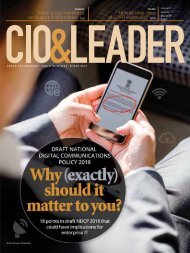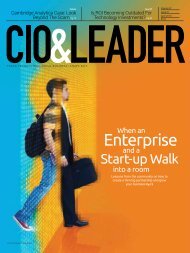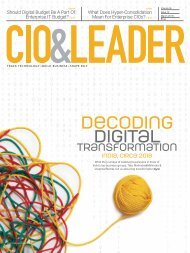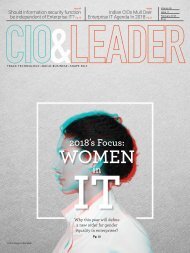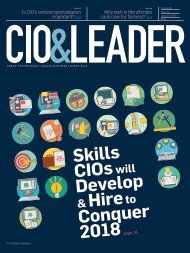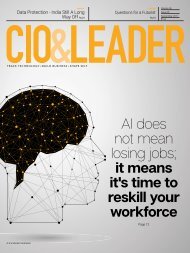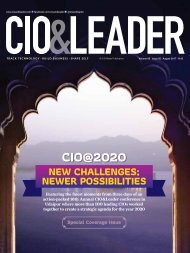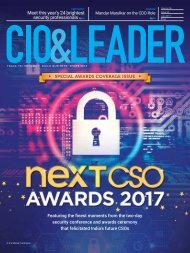CIO & LEADER-November 2017 (1)
Create successful ePaper yourself
Turn your PDF publications into a flip-book with our unique Google optimized e-Paper software.
Insight<br />
A<br />
According to 2018 Gartner <strong>CIO</strong> Agenda<br />
Survey, 51% of <strong>CIO</strong>s surveyed in India reported<br />
that they are taking charge of innovation and<br />
49% have indicated that they are heading up<br />
digital transformation.<br />
The survey results show that, overall 95% of<br />
<strong>CIO</strong>s expect their jobs to change or be remixed<br />
due to digitalization. IT delivery management<br />
is taking up less and less of the <strong>CIO</strong>'s time.<br />
Respondents believe that the two biggest transformations<br />
in the <strong>CIO</strong> role will be becoming a<br />
change leader, followed by assuming increased<br />
and broader responsibilities and capabilities.<br />
Globally growth is the No. 1 <strong>CIO</strong><br />
priority for 2018<br />
However in India, <strong>CIO</strong>s reported optimizing<br />
enterprise operational excellence (66%), tracking<br />
business value of IT (64%) and business cost<br />
optimization (62%) as their top priorities. The<br />
good news for <strong>CIO</strong>s in India is that more money<br />
will be available to support these priorities. IT<br />
budgets in India are expected to increase by<br />
7.4% in 2018. This compares to an expected 3%<br />
IT budget increase globally.<br />
Define the role – focus attention<br />
beyond IT<br />
At least 84% of all top <strong>CIO</strong>s surveyed have<br />
responsibility for areas of the business outside<br />
traditional IT. The most common are innovation<br />
and transformation. 51% of respondents in<br />
India said that the <strong>CIO</strong> in their organization is<br />
in charge of innovation while 49% said the <strong>CIO</strong><br />
heads up digital transformation and 30% said<br />
the <strong>CIO</strong> leads enterprise change. The survey<br />
found that <strong>CIO</strong>s are spending more time on the<br />
business executive elements of their jobs compared<br />
with three years ago. In fact, <strong>CIO</strong>s from<br />
top performing organizations are spending up<br />
to four days more on executive leadership. The more<br />
mature an enterprise's digital business is, the more<br />
likely the <strong>CIO</strong> will report to the CEO.<br />
In a change from previous surveys, respondents<br />
were asked to name the top differentiating technologies<br />
(in previous years they were asked about investment<br />
levels). Business intelligence (BI) and analytics<br />
still retain the No. 1 spot, with top performers most<br />
likely to consider them strategic.<br />
Implement the new role<br />
79% of <strong>CIO</strong>s report that digital business is making<br />
their IT organizations more "change-ready," which<br />
suggests that now is a good time to implement change<br />
to the IT organizations, and, in turn, should make the<br />
transition to the new job of the <strong>CIO</strong> easier.<br />
The first part of the new job of the <strong>CIO</strong> is to build<br />
the required bench strength to scale the enterprise's<br />
digital business through support for the digital ecosystem.<br />
This means hiring new resources to put in<br />
place the right digital team structures. Some <strong>CIO</strong>s<br />
favor a separate digital team while others make digitalization<br />
part of the day job of IT. However, 71% of<br />
the top performers have a separate digital team to<br />
help them scale their digitalization efforts. The most<br />
common structure for these teams is to report to the<br />
<strong>CIO</strong>, although the biggest difference between the top<br />
performers and their peers is in the CEO reporting<br />
relationship of these teams.<br />
"The effects of digitalization are profound.<br />
The impact on the job of <strong>CIO</strong> and on the IT organization<br />
itself should not be underestimated," said<br />
Rowsell-Jones. "In this new world, <strong>CIO</strong> success is not<br />
based on what they build, but the services that they<br />
integrate. The IT organization will move from manufacturer<br />
to buyer, and the <strong>CIO</strong> will become an expert<br />
orchestrator of services. The real finding though is<br />
that this is happening now. <strong>CIO</strong>s must start scaling<br />
their digital business and changing their own jobs<br />
with it now."<br />
<strong>November</strong> <strong>2017</strong> | <strong>CIO</strong>&<strong>LEADER</strong><br />
23



